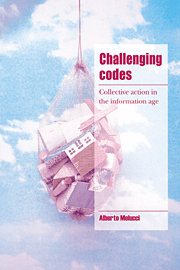Book contents
- Frontmatter
- Contents
- Preface and acknowledgements
- Introduction
- Part I Theory of collective action
- Part II Contemporary collective action
- 5 Conflicts of culture
- 6 Invention of the present
- 7 The time of difference
- 8 Roots for today and for tomorrow
- 9 A search for ethics
- 10 Information, power, domination
- Part III The field of collective action
- Part IV Acting collectively
- References
- Index
10 - Information, power, domination
Published online by Cambridge University Press: 23 November 2009
- Frontmatter
- Contents
- Preface and acknowledgements
- Introduction
- Part I Theory of collective action
- Part II Contemporary collective action
- 5 Conflicts of culture
- 6 Invention of the present
- 7 The time of difference
- 8 Roots for today and for tomorrow
- 9 A search for ethics
- 10 Information, power, domination
- Part III The field of collective action
- Part IV Acting collectively
- References
- Index
Summary
Power and inequality
We are on the brink of transformations that will prove critical for our society. The quality and nature of information, as a cognitive and symbolic resource which is at the centre stage in the determination of the future, remains deeply ambivalent. The perspective inspired by Foucault (1970, 1979, 1980) tends to view the system as fully controlled through the manipulation by invisible power centres, which entirely organize our lives (see also Baudrillard 1975). Other authors, more inspired by Marxism, tend to see contemporary social movements as forms of opposition and resistance to a generalized capitalist power, which is taking over at the world scale (Castells 1983; Arrighi et al. 1989). The problem with these conceptions is that if power were a form of total control, collective action could not even be conceptualized in its conflictual capacity and it would be reduced to a pure re-action. But in social practice power itself is caught up in the same problem of the ambivalence of its own instruments, provided we are not to postulate a total system which is not only totalitarian, but a fully transparent society of pure domination, of which I frankly do not see any signs. In the symbolic realm, there is always ambivalence on both sides.
- Type
- Chapter
- Information
- Challenging CodesCollective Action in the Information Age, pp. 176 - 204Publisher: Cambridge University PressPrint publication year: 1996

